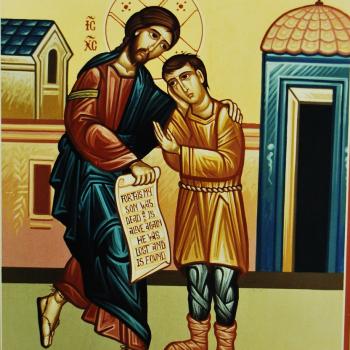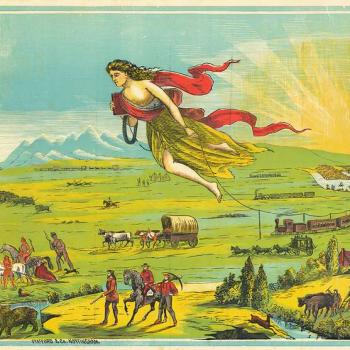Lectionary Reflections
Second Sunday of Easter
May 1, 2011
John 20:19-31
We have a common saying that expresses our insistence on tangible proof of every faith claim: "I'll believe it when I see it."
And just when will that be? I ask myself, as I read this passage about Jesus' appearances to the disciples and then to Thomas. When will the moment come when we look up and really notice, really see the Risen Lord who stands before us in every room in our house, in every situation in our lives? He is, in fact, standing beside you right now as you read this. Have you noticed?
The disciples were, John tells us, locked in their room "for fear of the Jews." "The Jews" is John's label for those among the religious leadership of the day who opposed Jesus. And, probably, code for those who opposed his community at the end of the first century. It doesn't refer to all Jews of Jesus' day and it certainly doesn't refer to Jews today.
I don't take the disciples' fear lightly. There was danger out there. Who knew whether the people who had killed their leader would now come after them? (Jn. 15:18, 19) Or whether they would be accused of having stolen his body in some resurrection scam? They were locked in their room with their fear and their grief.
That was bad enough, but now Mary had to come and introduce a ridiculous hope into their grief: that she had seen him and that he had spoken to her. How could such a thing be true? If I had been there in that locked room, I would have been thinking "I'll believe it when I see it." But the fact that I was looking down would have made that impossible. I would have tried looking at the four walls and the locked door. But all they signal is fear and false security. I would have tried looking at my friends' faces. But all they signal is grief and confusion. So I would have been looking down when the Risen Lord arrived.
There is so much we miss when we're looking down.
In these two scenes (Jn. 20:19-23 and 20:24-29) taken together, there are a couple of crucial things we would miss.
We would miss our Risen Lord's greeting.
We would miss his good news.
We would missthe Risen Jesus' Greeting:"Peace be with you."
Jesus' greeting is not a statement of what Jesus wishes for his disciples. It is a statement of fact, of present reality. And he says it not once, but three times (Jn. 20:19, 21, 26). In early Christian worship services, the "passing of the peace" echoed this greeting of the Risen Lord whom they believed, as we do today, that he was in their midst when they gathered to worship. Worshipers greeted one another with the kiss of peace and the words "The Peace of Christ be with you." I always feel cheated when, in a worship service these days, we are told to greet one another and everybody goes around shaking hands and saying "Good morning."
"I hope you are having a good morning" is a far cry from "The Peace of Christ be with you." The former is wishful thinking. The latter is a statement of the way things are because the Risen Christ, present with us in worship, has brought us peace.
Jesus wasn't the first to use this greeting. "Peace be with you" is a greeting used by God in the Old Testament when God approaches humans and they tremble with fear of punishment. (See Jdg. 6:23.) It conveys that the divine manifestation will not harm the recipient.
In the Old Testament, peace is invoked, not only in greetings, but also in farewells. "Go in peace" (1 Sam. 1:17, 20:42; 2 Sam. 15:9; 2 Kgs. 5:19).
The psalms and prophets speak of the peace of God. Peace is God's gift of inner serenity to those who place their trust in God (Ps. 4:8; Is. 26:3, 12). Peace is both the goal (Ps. 34:14) and the reward of righteousness (Is. 32:17). Its presence will be a sign of God's reign (Ps. 85:10). Peace results when one loves and follows God's law (Ps. 119:165).
This isn't the first time Jesus has uttered this greeting. "Peace be with you," is the fulfillment of a promise Jesus made to his disciples in chapter 14 of John's Gospel (Jn. 14:18-28). The disciples were afraid that they would be "orphaned" (14:18). Jesus assured them that the Father, in his name, would send the Holy Spirit to both "teach and remind" them of Jesus' message (14:26). He then promises them peace.
"Peace I leave with you; my peace I give to you. I do not give to you as the world gives. Do not let your hearts be troubled and do not let them be afraid . . . I am going away and I am coming to you" (14:27, 28).
Well, now he's back, as promised. Now here he stands in the midst of his disciples whose hearts are both troubled and afraid, reminding them of the gift of peace which he has already given them.
References to peace in the New Testament aren't limited to John's Gospel. Jesus, in the Sermon on the Mount, encourages peace as the posture of the disciple. Pointing out that we can't add an hour to our lifespan by anxiety, and that God will provide for us, he advises his followers to "Strive first for the kingdom of God and his righteousness and all these things will be given to you as well" (Mt. 6:33).





